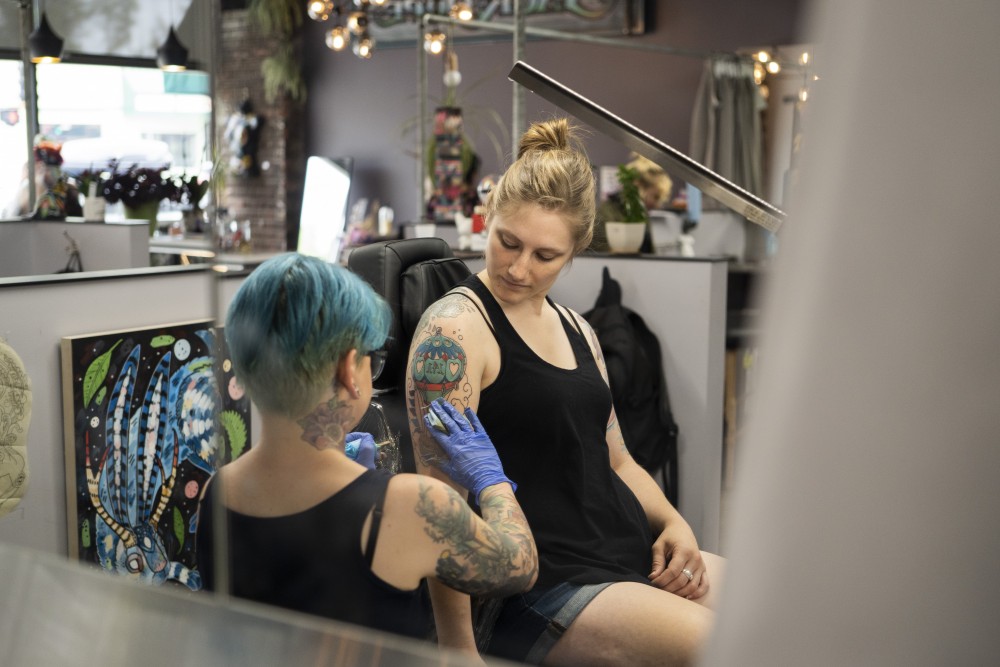The atmosphere of Jackalope Tattoo is calming — the low buzzing of a tattoo machine provides background noise to the banter of artists over their half-walled cubicles.
Around the shop, the walls are adorned with sketches, paintings and sculptures; leafy plants drape over desks and ledges. A stuffed rabbit with antelope horns guards a skull in the waiting area.
Jackalope Tattoo is unique in that it’s home to only female or non-binary artists.
“Our industry is really filled with a lot of toxic masculinity,” said owner Emi Nijiya Tuesday as they tattooed a raven on a client. “Getting tattooed is such an intimate experience, so we wanted to make sure that our clients felt safe coming here.”

Having worked in other shops where Nijiya was not comfortable expressing themself, it was important for Nijiya to create a space where artists could practice their craft without feeling unsafe.
The artists’ comfort is evident in their workspaces, each with a small cubicle in the general area to make their own. Nijiya’s is covered in black and white sketches of previous tattoo work, a sassy embroidery piece with the words ‘Fuck Politeness’ and photo booth portraits with friends and family.
Artist Amo Azure has their illustration work hanging on the wall, and Jessie McNally’s space is full of her intricate and colorful paintings and sculpture.

“Some stories that I’ve heard from clients [about] things that male tattoo artists have done to them while they’re in a vulnerable state like [being tattooed] — it’s unsettling, because you would never want to think that someone you trust to permanently mark your body would act that way, but they do,” Nijiya said. “There are obviously a lot of good male artists in the industry that would never act that way, but I think it’s still important to have spaces like this.”
For McNally, who tattooed in male-dominated shops for 15 years, working at Jackalope for the past year and a half has been eye-opening.
“I didn’t realize how amazing it felt to everyday walk into work and not have the fear of somebody saying something horrible to you or ignoring you,” she said. “I guess I never considered that this was an option … that I didn’t have to deal with bullshit. Or that if I disagreed with something, I could speak up and feel safe — that I had a voice. At the time I didn’t realize how much it affected me.”
Many of the artists at Jackalope Tattoo make the time to spend evenings together outside of work and have grown into life-long friends. Nijiya said they’ve never felt this kind of intimacy with coworkers before and, although they’re all different, they get along well.
“Honestly these guys are my family and I wanted them to have a home and have a place that they felt that could stay in long-term,” Nijiya said. “I think a lot of shops have a lot of turnover. We have had very little to none.”

Jackalope receptionist Jamaeka Elizabeth said having a space as inviting as this one not only makes those working there feel more comfortable, but also helps clients feel safe too.
“People really have stories that go behind [their tattoos] and it means a lot to them,” she said. “One of my favorite things to see is people getting cover-ups or revamps, because it’s them reclaiming something that doesn’t feel right about their body anymore. I love to see that because those people are so happy.”
Armed with a tattoo machine and a grin, Jackalope Tattoo is breaking out of the mold and making way for a new wave of tattooers.
“That whole boys club mentality doesn’t fit to our society anymore. This industry’s changing. Tattoos are changing. People are changing,” McNally said. “People are starting to say ‘Hey, you know what? That’s not working for me anymore.’”








